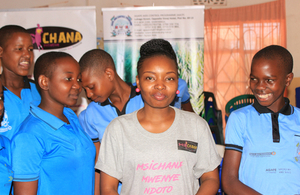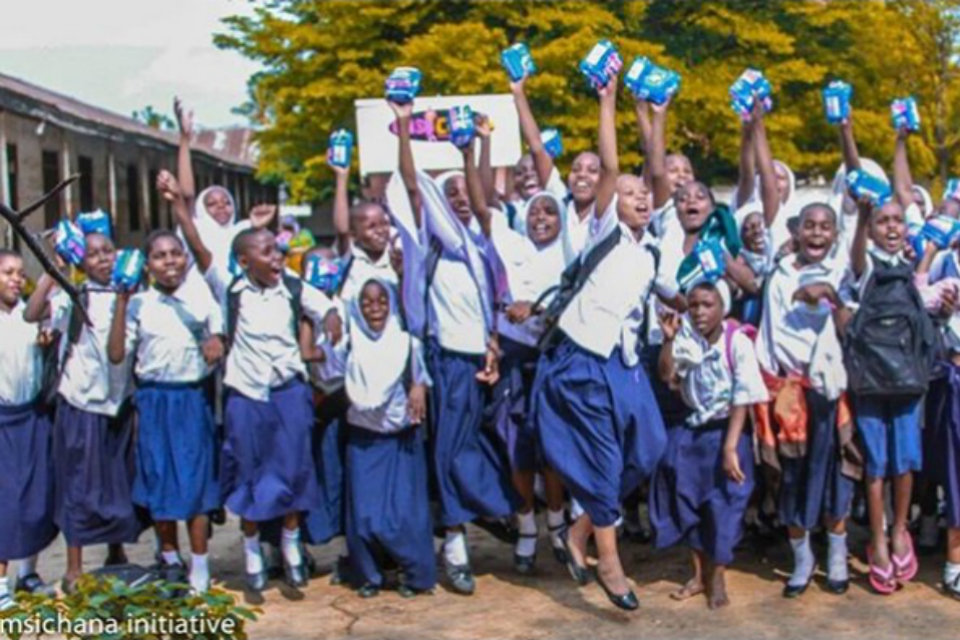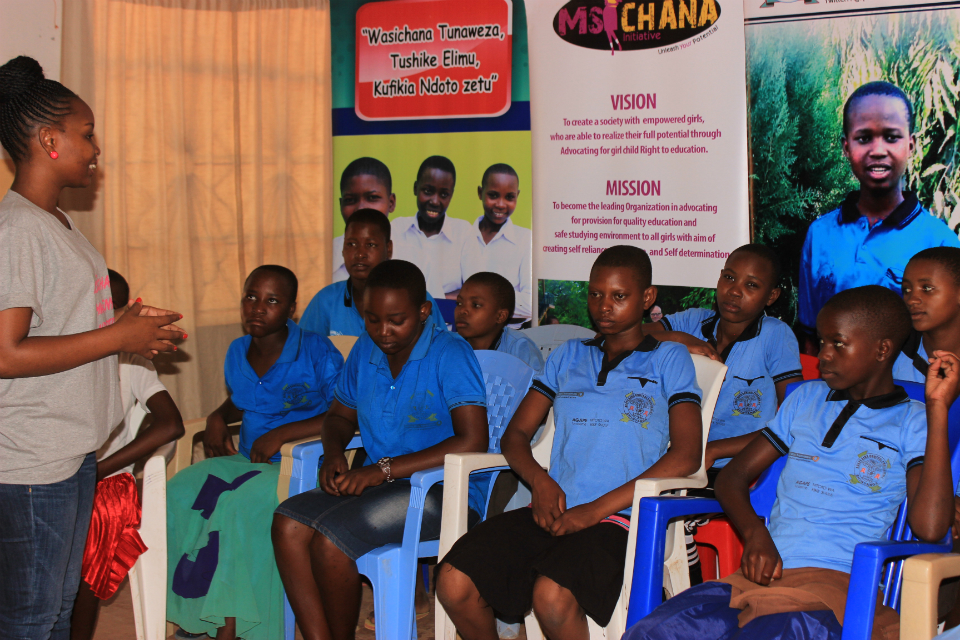Getting girls to school in Tanzania: Rebeca Gyumi
Rebeca founded an organisation that empowers girls through education, and worked with the British High Commission in Tanzania on mentoring for school girls.

Rebeca Gyumi with some schoolgirls
鈥淓veryone has a chance to contribute in improving the state of our communities, it doesn鈥檛 matter how small the contribution is. Every action counts.鈥� Rebeca Gyumi
The early years
Rebeca was born in Dodoma, Tanzania. The young Rebeca would not have known then the impact she would make on girls and young people up and down the country in years to come.
UNESCO figures show that in 2009 only 24% of girls went onto secondary level education, with literacy rates at 67%. Coupled with socio-cultural factors like early marriages and pregnancies, girls were in a cycle of a lack of education and low literacy. Against this backdrop Rebeca took the decision to better the lives of young people, and particularly girls, in Tanzania.
Rebeca credits her background as one of the factors that have contributed to her drive for advocating for girls鈥� rights. Growing up, she saw first-hand, how important it is to invest in girls and in women. Her mother played a huge role in her education and that of her siblings, from selling fish to second hand clothes (mitumba), all so her children could go to school. It鈥檚 from such experiences that Rebeca aspired to work in advancing girls鈥� and women鈥檚 rights in her community.
The Msichana Initiative
Rebeca founded the in 2016. It is a local non-government organisation (NGO) which aims to empower girls through education, addressing the challenges which often hinder a girl鈥檚 access to education.
Rebeca鈥檚 work through Msichana Initiative has been instrumental in triggering discourse on child marriages and the need to put more effort in ending child marriages in Tanzania. In 2016, Rebeca successfully challenged the country鈥檚 Marriage Act of 1971 which allowed girls as young as 14 to marry. She succeeded in bringing the legal age of marriage up to 18 for both girls and boys. Her legal case is also shaping public discussion on the importance of girls鈥� education and the multiplier effect in investing in a girl child.
Through the initiative she founded, they have established Msichana Clubs (girls鈥� clubs) in Dar es Salaam, Moshi, Bagamoyo, Dodoma and Lindi. These girls鈥� empowerment clubs create space for boys and girls to talk about gender equality issues in their areas and learn to be empathetic towards each other.

Group of school children.
Creating safe space
Through community outreach, the Msichana Initiative has facilitated the establishment of 12 Child Protection Teams (CPTs) in Bahi, Kongwa and Chamwino districts in Dodoma, Tanzania鈥檚 capital city. The CPTs are linked with Msichana Cafes which are informal community platforms for identifying, discussing and finding solutions for key pressing issues which girls are facing in their communities like child marriages, teen pregnancy and abuse. To date, there are 10 Msichana cafes which have identified and solved 12 cases on protection of girls鈥� rights in collaboration with the Police Gender Desk.
Rebeca is a staunch advocate for safe schools and better quality education. Her engagement with the youth of the country on key issues like sexual health and economic empowerment has allowed open conversations with decision makers. Through Agenda ya Msichana Forum, an annual girls鈥� conference which the organisation initiated, 800 girls from different parts of the country get to meet with key decision makers and talk about pressing issues that are limiting their access to education.
British Embassy, Dar es Salaam
Rebeca has also been working with the British High Commissioner in Tanzania, Sarah Cooke, to roll out the Adopt-a-School programme, a mentoring programme for young school girls in Tanzania. The programme started when the High Commissioner rolled out a mentoring scheme working with young girls. This collaboration with Rebeca saw the scheme evolve bringing together women leaders, professionals, activists, and entrepreneurs in various sectors to mentor young school girls and help them become the best they can be.
Through the Adopt-a-School mentorship programme, Rebeca and Sarah have been able to reach girls who would not typically have access to mentors, and who would typically need encouragement to stay in school and to dream big. With this powerful partnership, the programme has also been able to bring on board successful women leaders in Tanzania as mentors. Recently Flaviana Matata, a Tanzanian super model and philanthropist, joined the mentorship programme as a mentor.

Rebeca Gyumi talking to a large group of school children.
Recognition and the future
Rebeca has been recognised globally for her efforts in advancing the rights of girls and the youth. In 2016 she was named as a for work on girl鈥檚 rights in Tanzania. In the same year, New African Woman magazine named her as one of the 2016 African Women of the Year.
As 2018 starts, girls in Tanzania can dream of a bright future and opportunities not open to those who came before them. Rebeca Gyumi, the Human Rights Defender for girl鈥檚 rights, has shown that with a determined agenda and a cause worth fighting for, change can happen.
鈥淓nsuring every girl has access to education means girls marrying at a right age, a drop in teen pregnancy rate and reduced maternal and infant mortality in our country. Investing in girls鈥� education is a right thing and a smart move.鈥� Rebeca Gyumi